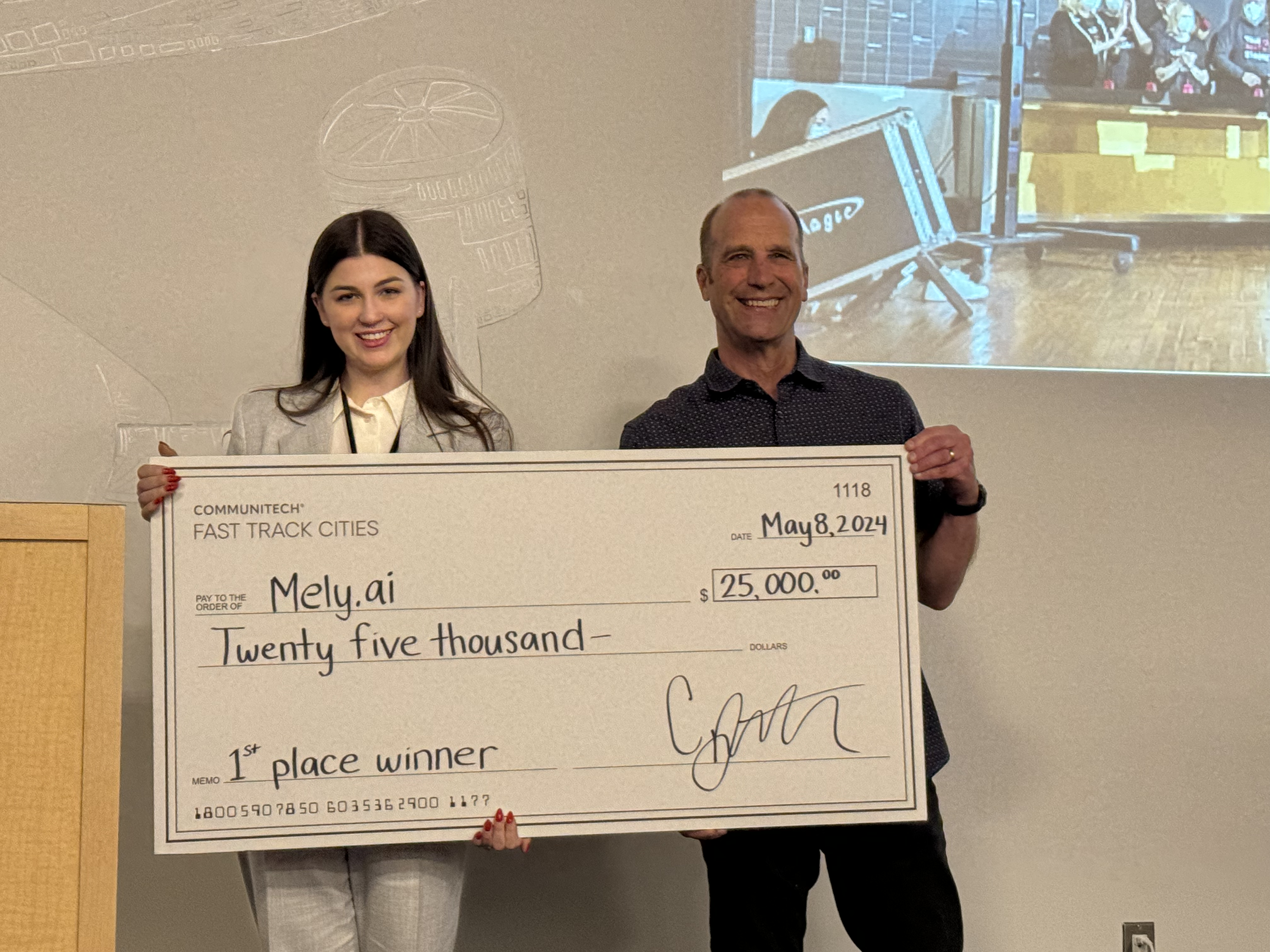Shopping online may seem effortless as you browse, click to buy and wait for your package to arrive at your doorstep. Behind the scenes of this seemingly seamless process, however, is a complex supply chain process. From a shortage of delivery drivers to congested streets and limited parking, companies face several challenges when it comes to getting these special deliveries to the store or to your door. Add in plenty of paperwork and it’s clear that meeting tight deadlines and keeping up with surging consumer demand for swift and dependable deliveries is no small feat.
Finding innovative ways to solve these problems was the theme at the Communitech Fast Track Cities Showcase on May 8, 2024, where six Canadian companies were selected to pitch their solutions.
“We’re excited about bringing founders together to explore how to use the right technology to make things better, whether it’s tracking shipments, tackling worker shortages or smoothing out logistics,” said Carleigh Johnston, Fast Track Cities Program Manager at Communitech. “By connecting Canadian tech startups with industry partners we can work towards identifying sustainable solutions.”
The Fast Track Cities team worked with partners to identify three challenges:
- Last mile delivery in urban centres
- A driver labour shortage and skills gap
- The need for enhanced supply chain visibility
These six companies were selected to pitch their solutions at the showcase event at the Communitech Hub and to those watching a live stream across Canada:
- Bluicity provides services to food logistics chains to improve operations, reduce food waste and fulfill food agency reporting.
- DriverDX helps carriers find and connect with commercial drivers instantly, streamlining the hiring process.
- Gomove uses its platform to enable businesses to share resources, creating a collaborative ecosystem to optimize routes and truck space.
- Mely.ai Solution uses its AI-powered platform to automate the handling of non-templated logistics and trade documents in multiple languages within the transportation and logistics sectors.
- Real Life Robotics uses AI-supported autonomous delivery robots to navigate urban environments with minimal tele-supervision.
- Vite Biz uses AI-driven insights to deliver personalized and engaging pre-training modules for drivers that encompass a wide range of topics, including safety protocols.
One of the biggest challenges highlighted during the showcase is the driver shortage and skills gap across North America, which contributes to delivery delays and poses challenges for companies striving to meet demand, resulting in increased costs.

“The problem in North America is that we’re experiencing the worst driver shortage in history thanks to the pandemic and baby boomers retiring,” said Angie Ricci, founder and CEO of DriverDX. “We see this as an opportunity to rebuild an outdated system that no longer serves this on-demand world.”
Drivers play a critical role in any carrier’s operation, but it’s estimated the truck driver shortage will double in the U.S. by 2030. Ricci also pointed out what she believes is an elephant in the room: autonomous vehicles.
“We might be thinking they’ll solve this problem, but not today,” she said.
DriverDX is trying to bridge the gap between the current state of the industry and the impending future of autonomous vehicles. Their platform offers drivers a spectrum of benefits, including flexible work hours and commutes, equitable wages, avenues for professional development and the capability to find work regardless of their location or destination.
“We’re building this for the next generation,” said Ricci. “We need to put our people first. That’s the ROI. That’s the investment. That’s sustainability.”
The pitch showcase also highlighted challenges surrounding last mile delivery, the final step in getting goods from distribution centres to stores or customers’ doorsteps. During this phase, drivers often face traffic problems, limited parking and time constraints, which can lead to higher costs.
“Being part of a rapidly growing delivery market, we noticed big problems and even bigger opportunities,” said Sam Cherhabil, founder and CEO of Gomove. The company’s platform is designed specifically for big and bulky goods delivery, enabling businesses to schedule and plan efficient routes in real time.
Customers want fast and reliable service, putting pressure on delivery companies to be as quick as possible while ensuring goods aren’t damaged during the process, and while ensuring shipping costs are kept down.

Keeping track of where products are at every stage of their journey – from production to delivery – is also critical to help companies run efficiently and reduce risks like delays or shortages.
“Logistics companies process more than a million pages of documents annually to manage the movement of goods,” said Olha Mullyar, Sales Executive at Mely.ai. “That’s not acceptable.”
Mullyar said sorting through large volumes of paperwork is a time consuming and prone to error process that can compromise overall company performance.
“Observing these challenges firsthand fuelled my passion to support the industry with AI solutions,” said Mullyar.
The presenting companies also competed for cash prizes, with Gomove securing a $10,000 prize, Bluicity earning $15,000 and Mely.ai receiving $25,000 in addition to the Viewer’s Choice Award.
The showcase event was sponsored by supply chain logistics solution provider Purolator.
“We’re on the forefront of seeing logistics transform our cities and communities, especially post-COVID,” said Dariusz Grabka, head of the Digital Lab, an R&D technology department at Purolator.
Grabka shared details of Purolator’s commitment to environmental sustainability and its ambition to become the greenest courier in Canada. This includes plans for zero-emission deliveries, supported shared goals with municipal and provincial governments, reduced noise and congestion, convenient retail options for residents and students, easier access to busy downtown areas and fewer parking tickets.
“At Purolator, we’re always trying to find new and exciting models and secure the services of companies to help us with our core business,” said Grabka. “It’s insightful to hear what these companies think is interesting and valuable in logistics and parcel delivery. These are spaces that maybe haven’t seen as much love, but definitely post-COVID you saw a boom and interest in the space.”
After the presentations, attendees and representatives from the six selected companies were invited to network and find potential partnership opportunities. The selected companies will also receive coaching from Communitech’s experienced growth coaches and professionals in urban-transportation industries across the country and get introduced to potential customers.

